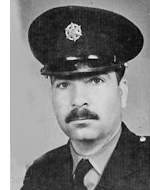Jonah, Solomon
Son of Jonah and Elijah. Shlomo was born on December 24, 1929 in Mosul, Iraq. He attended a school in Iraq and graduated from the Gymnasium in 1950. Since he immigrated to Israel, he did not receive the graduation certificate. Shlomo married Nira on 5.2.1952 and immigrated to Israel a few months after his marriage. In Israel, the couple lived in the Nahariya transit camp, and Shlomo served in the army, in the air force. Shlomo joined the police in 1959. He worked in policing and later went on to a research course. At the end of the course he was placed in a tortured police station. In the Six Day War he served in the Sakhnin police. At the end of the war he served in the Tulkarm police. He loved his work and worked very devotedly. In his last position he served as a researcher at the Nahariya police station. Shlomo had a husband and a supportive friend who loved his wife and had a model father for his children. He was the mainstay of the family. He was a pleasant, broad-minded man who could find a common language with all those around him. He was a patient and patient man who served as an adult friend and could talk to them “at eye level.” He was a good friend to his friends and many friends. A warm-hearted man who used to make peace and bring about compromise during a conflict and a quarrel. On Sunday, 11.4.1974, an entire sergeant died of a brain hemorrhage due to a blow he received in his head from a suspect during an arrest. Forty-five years old. He was buried in the cemetery in Nahariya. Survived by his wife, Nira, and their four children – David, Rachel, Aryeh and Hagit. The absence of Shlomo accompanied the family over the years and his memory remained alive in their hearts as well as longing for him. “My father died when I was 10. As a child, it fell like a thunderstorm to me, and my connection with my father was very warm and special, and it was very significant for me, and perhaps because I had reached the age of eight at the stations of Sakhnin and Tul Karm, I usually remember his hug and how he used to drive me to school in the mornings on his scooter, the house full of happiness and the activity changed beyond recognition at the time of my father’s death and since then Has returned to normal. “
